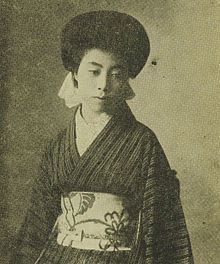Katō Shizue
Katō Shizue ( Japanese 加藤 シ ヅ エ ; * March 2, 1897 in Tokyo as 広 田 静 枝 Hirota Shizue ; † December 22, 2001 ) was a Japanese feminist and one of the first women to be elected to the Japanese parliament . Katō was known as a pioneer of the birth control movement and a great supporter of labor law reforms.
biography
Katō Shizue was born in Tokyo in 1897 into a rich and influential family. It was at the Gakushuin University teaches and 1914 which was ten years older, liberal Danshaku Ishimoto Keikichi betrothed, who at the mining company Mitsui Kozan as engineer was employed, which is why they just after the wedding to Kyushu for Miike coal mine covered. It was here that she first saw the harrowing conditions under which miners had to do their work.
In 1919 she and her husband moved to New York City , where she completed an apprenticeship as a secretary. The couple's two sons stayed with their grandparents. In New York, an encounter with birth control activist Margaret Sanger changed her life goals. She decided to teach Japanese women about the possibilities of family planning. After her return to Japan, she organized a visit from Sanger and made it possible for him to give lectures. Over the next few years she was to invite Sanger to Japan six more times.
In 1931 she founded her first birth control organization and became its chairman. An advisory body followed in 1934, which was closed again in 1937 by the Second Sino-Japanese War . Her husband began working for the growing Japanese Empire and moved to Manchuria without her and the children . She began an affair with the also married Katō Kanjū , a member of the House of Commons, later co-founder of the Socialist Party and Minister of Labor. In March 1944 she achieved her divorce from Ishimoto Keikichi and married Katō Kanjū in November of the same year. Their daughter was born on March 30, 1945.
On April 10, 1946, she was elected to the House of Commons of Japan and then joined the Socialist Party of Japan . She was elected to the House of Lords in 1950 and held that position for 24 years until she retired in July 1974. In 1948 she founded the Japan Family Planning Association (JFPA), a member of the International Planned Parenthood Federation .
In 1988 she was honored for her work by the United Nations ( United Nations Population Award ), and in 1996 the Kato Shizue Award was launched by Attiya Inayatullah .
She died on December 22, 2001 at the age of 104.
literature
- Helen M. Hopper: Kato Shidzue: A Japanese Feminist. 2003, Longman, ISBN 0-321-07804-7
- Shidzue Ishimoto: Facing Two Ways: The Story of My Life. Autobiography, 1935, Farrar & Rinehart
Web links
- Obituary in the Guardian (English)
| personal data | |
|---|---|
| SURNAME | Kato, Shizue |
| ALTERNATIVE NAMES | 加藤 シ ヅ エ (Japanese); Ishimoto Shizue; 広 田 静 枝 Hirota Shizue (maiden name); Kato Shidzue |
| BRIEF DESCRIPTION | Japanese feminist |
| DATE OF BIRTH | March 2, 1897 |
| PLACE OF BIRTH | Tokyo |
| DATE OF DEATH | December 22, 2001 |
